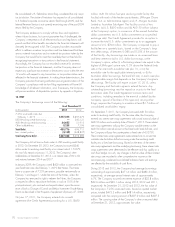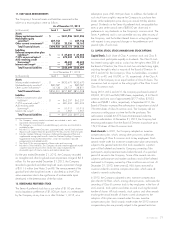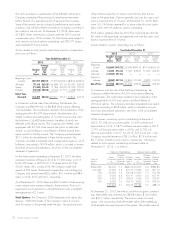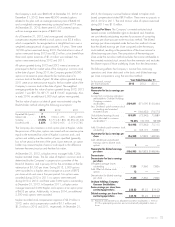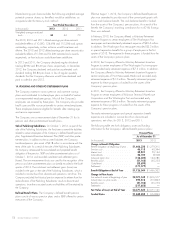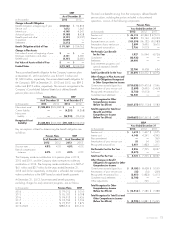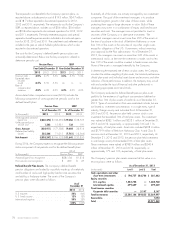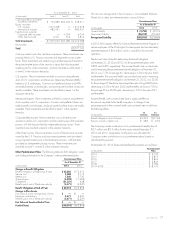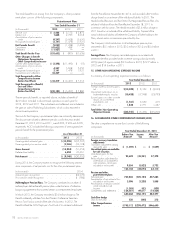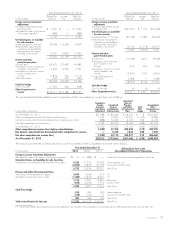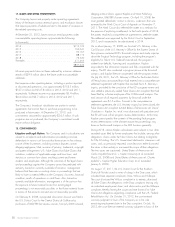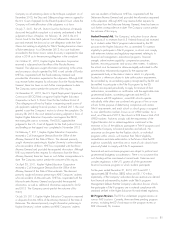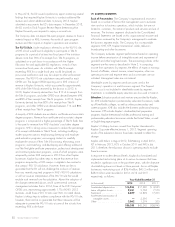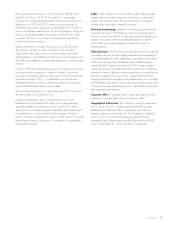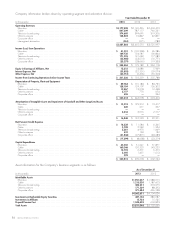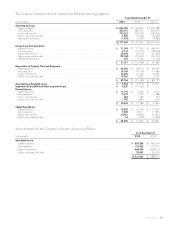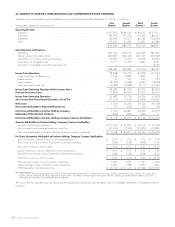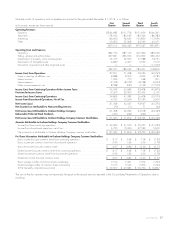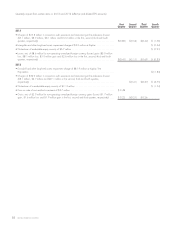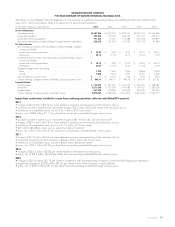Washington Post 2013 Annual Report Download - page 98
Download and view the complete annual report
Please find page 98 of the 2013 Washington Post annual report below. You can navigate through the pages in the report by either clicking on the pages listed below, or by using the keyword search tool below to find specific information within the annual report.
17. LEASES AND OTHER COMMITMENTS
The Company leases real property under operating agreements.
Many of the leases contain renewal options and escalation clauses
that require payments of additional rent to the extent of increases in
the related operating costs.
At December 31, 2013, future minimum rental payments under
noncancelable operating leases approximate the following:
(in thousands)
2014 ...................................... $119,129
2015 ...................................... 106,041
2016 ...................................... 99,167
2017 ...................................... 88,119
2018 ...................................... 73,520
Thereafter ................................... 411,466
$897,442
Minimum payments have not been reduced by minimum sublease
rentals of $29.9 million due in the future under noncancelable
subleases.
Rent expense under operating leases, including a portion reported
in discontinued operations, was approximately $118.5 million,
$127.2 million and $127.8 million in 2013, 2012 and 2011,
respectively. Sublease income was approximately $5.4 million,
$4.4 million and $2.7 million in 2013, 2012 and 2011,
respectively.
The Company’s broadcast subsidiaries are parties to certain
agreements that commit them to purchase programming to be
produced in future years. At December 31, 2013, such
commitments amounted to approximately $34.5 million. If such
programs are not produced, the Company’s commitment would
expire without obligation.
18. CONTINGENCIES
Litigation and Legal Matters. The Company and its subsidiaries are
subject to complaints and administrative proceedings and are
defendants in various civil lawsuits that have arisen in the ordinary
course of their businesses, including contract disputes; actions
alleging negligence, libel, invasion of privacy; trademark, copyright
and patent infringement; U.S. False Claims Act (False Claims Act)
violations; violations of applicable wage and hour laws; and
statutory or common law claims involving current and former
students and employees. Although the outcomes of the legal claims
and proceedings against the Company cannot be predicted with
certainty, based on currently available information, management
believes that there are no existing claims or proceedings that are
likely to have a material effect on the Company’s business, financial
condition, results of operations or cash flows. Also, based on
currently available information, management is of the opinion that
the exposure to future material losses from existing legal
proceedings is not reasonably possible, or that future material losses
in excess of the amounts accrued are not reasonably possible.
On February 6, 2008, a purported class-action lawsuit was filed in
the U.S. District Court for the Central District of California by
purchasers of BAR/BRI bar review courses, from July 2006 onward,
alleging antitrust claims against Kaplan and West Publishing
Corporation, BAR/BRI’s former owner. On April 10, 2008, the
court granted defendants’ motion to dismiss, a decision that was
reversed by the Ninth Circuit Court of Appeals on November 7,
2011. The Ninth Circuit also referred the matter to a mediator for
the purpose of exploring a settlement. In the fourth quarter of 2012,
the parties reached a comprehensive agreement to settle the matter.
The settlement was approved by the District Court in September
2013, and is expected to be administered in 2014.
On or about January 17, 2008, an Assistant U.S. Attorney in the
Civil Division of the U.S. Attorney’s Office for the Eastern District of
Pennsylvania contacted KHE’s Broomall campus and made inquiries
about the Surgical Technology program, including the program’s
eligibility for Title IV U.S. Federal financial aid, the program’s
student loan defaults, licensing and accreditation. Kaplan
responded to the information requests and fully cooperated with the
inquiry. The ED also conducted a program review at the Broomall
campus, and Kaplan likewise cooperated with the program review.
On July 22, 2011, the U.S. Attorney’s Office for the Eastern District
of Pennsylvania announced that it had entered into a comprehensive
settlement agreement with Kaplan that resolved the U.S. Attorney’s
inquiry, provided for the conclusion of the ED’s program review and
also settled a previously sealed False Claims Act complaint that had
been filed by a former employee of the CHI-Broomall campus. The
total amount of all required payments by Broomall under the
agreements was $1.6 million. Pursuant to the comprehensive
settlement agreement, the U.S. Attorney inquiry has been closed, the
False Claims Act complaint (United States of America ex rel. David
Goodstein v. Kaplan, Inc. et al.) was dismissed with prejudice and
the ED will issue a final program review determination. At this time,
Kaplan cannot predict the contents of the pending final program
review determination or the ultimate impact the proceedings may
have on the Broomall campus or the KHE business generally.
During 2013, certain Kaplan subsidiaries were subject to two other
unsealed cases filed by former employees that include, among other
allegations, claims under the False Claims Act relating to eligibility
for Title IV funding. The U.S. Government declined to intervene in all
cases, and, as previously reported, court decisions either dismissed
the cases in their entirety or narrowed the scope of their allegations.
The two cases are captioned: United States of America ex rel.
Carlos Urquilla-Diaz et al.v. Kaplan University et al. (unsealed
March 25, 2008) and United States of America ex rel. Charles
Jajdelski v. Kaplan Higher Education Corp. et al. (unsealed
January 6, 2009).
On August 17, 2011, the U.S. District Court for the Southern
District of Florida issued a series of rulings in the Diaz case, which
included three separate complaints: Diaz, Wilcox and Gillespie.
The court dismissed the Wilcox complaint in its entirety; dismissed
all False Claims Act allegations in the Diaz complaint, leaving only
an individual employment claim; and dismissed in part the Gillespie
complaint, thereby limiting the scope and time frame of its False
Claims Act allegations regarding compliance with the U.S. Federal
Rehabilitation Act. On October 31, 2012, the court entered
summary judgment in favor of the Company as to the sole
remaining employment claim in the Diaz complaint. On July 16,
2013, the court likewise entered summary judgment in favor of the
80 GRAHAM HOLDINGS COMPANY


